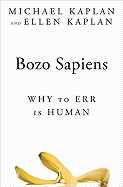

In Bozo Sapiens, we find out that we certainly have the equipment and potential to be as smart as we think we are, but there are obstacles. "Our emotions, bred in the distant past of intimate tribal life, offer no clear guide for keeping apart personal from general frustrations, local from global sympathies," Michael and Ellen Kaplan (Adventures in Probability) write in this informative, entertaining and humbling book. They take a gander at how our thought processes get short-circuited when it comes to money, sex or us-versus-them issues and deliver the verdict that we aren't wired to think rationally. As they put it, "We are more likely to draw on the wordless, passionate resources of our old mammalian brain."
Drawing on recent research, the Kaplans present an accessible survey of the way our brains actually work. With its trillion neurons firing electric signals to each other, the brain categorizes information it receives and arranges random fragments of experience into a "meaningful" explanation of a situation. With its need for efficiency, the brain also mixes in-depth and hearsay knowledge; more than a third of our brain is devoted to visual capacity and our visual responses may make a decision for us before our conscious mind is ever engaged. Consider the simple French fry: its combination of caramelized sugars, fat and saltiness is irrationally irresistible to us, but we inherited this taste from our distant ancestors in a village of approximately 100 members. No matter what is good for us, the evidence is everywhere: the desire for speedy decisions and our ancient instincts prevail over rational thinking.
Is there any hope for us? The Kaplans present many examples that show we can learn to slow ourselves down so that our powerful rational mind can kick in to help us solve not only personal problems but global challenges as well. But if an attractive somebody in a Lamborghini offered you an order of fries . . . --John McFarland
Shelf Talker: An informative, entertaining and humbling tour of how our brain works--sometimes against our better interests.

